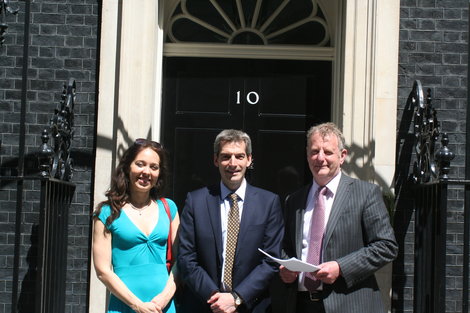
The letter signed by the coalition includes big names like IKEA, Triodos Bank, Ecotricity, Kyocera, Interface, the Centre for Renewable Energy Systems Technology at Loughborough University and Good Energy. It was also signed by a host of small businesses engaged in UK solar, revealing an industry made up of over 2,000 small and medium sized businesses supporting 16,000 jobs – in stark contrast to the Big 6 utilities.
The delivery of the letter, organised by the Solar Trade Association (STA), coincides with the closure of consultation on proposed changes to support mechanisms for solar power. The proposals are already having a damaging effect on parts of the sector, but solar parity with conventional energy, expected in the near future, will deliver many positive benefits for UK businesses including improving international competitiveness, lower energy price inflation and improved electricity sector competition.
The letter highlights the critical importance of commercial and industrial roofs, alongside solar farms, in the delivery of low-cost solar energy. It urges the Prime Minister to secure the UK industry given the £78billion per annum global solar market anticipated in 2020.
The Department of Energy and Climate Change (DECC) has set out a vision in its Solar PV Strategy anticipating a solar boom across large roofs. However, the STA argues that the current policy framework is not enabling this to happen and that the DECC consultation on Feed-In Tariffs (FITs) doesn’t address the policy failure on mid to large solar roofs.
“Solar is a home-grown solution to Britain’s energy crisis” said Solar Trade Association Chief Executive Paul Barwell. “If the Government provides a stable policy environment solar will soon be subsidy free. But the Government is now proposing to tilt the playing field against large-scale solar, while not taking sufficient action to unlock commercial rooftop solar - that is unacceptable. We urge DECC not to close the Renewables Obligation to large-scale solar and to rethink proposals on Feed in Tariffs to allow a meaningful rooftop market which their own Solar PV Strategy recognises has such tremendous potential.”
Mr Barwell added that the level of policy uncertainty risks derailing the extraordinary progress the large-scale industry has made in delivering jobs and reducing technology costs in the last few years. It is also putting the UK’s position in the booming global solar market at risk. Mr Barwell believes that the UK only needs one more period of policy stability in order to be able to compete with fossil fuels without support.
Jeremy Leggett, Chair of SolarAid and Non-executive Chair of SolarCentury, described the government’s mindset as needing to ‘catch up’ with the achievements of the UK solar industry since 2010.
“It's time that the government woke up to the fact that, with stable support, jobs rich UK solar will be cheaper than onshore wind during the next Parliament, opening up immense opportunities for UK PLC and driving down the costs of delivering the 2020 renewable energy target in the process” said Mr Leggett.
“Far from slamming the brakes on large-scale solar, the Prime Minister should be hailing it as one of Britain's renewable energy success stories and getting behind it. Instead he prefers to push fracking, even in National Parks.”
The two DECC consultations focus on controlling spending for large-scale PV within the Renewables Obligation (RO) and ‘promoting the deployment of midscale building-mounted solar PV’ under the FIT. However, the STA believes that DECC’s claims that large-scale solar is a threat to the Renewables Obligation budget are ill-founded, given that solar currently accounts for just 5 percent of RO expenditure.
The National Audit Office (NAO) has also recently criticized DECC for awarding 58 percent of the entire 2020 renewable energy budget to just 7 projects, 6 of which are more expensive than solar power. Furthermore, the department’s proposals to ‘promote’ the deployment of rooftop solar under FITs are wide of the mark on the essential changes necessary to enable the take-off of roof-top solar. The STA is therefore urging DECC to produce a new consultation that properly addresses the barriers to roof-top solar deployment.
The letter is being handed over to Downing Street at 12noon today (Monday 7 July).
For additional information:
DECC Consultation on changes to financial support for solar PV

